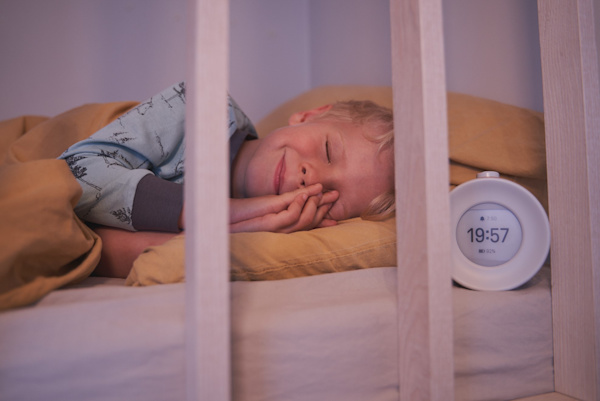
Well-rested kids are happy kids (and also happy parents)!
Sleep = Happiness
For children, sleep is more than rest. It’s the foundation of growth, learning, and resilience. A well-rested child is calmer, happier, and healthier, which naturally makes for happier parents too. Anyone who has welcomed a baby into their life knows just how disruptive sleepless nights can be for the entire family. Lack of sleep leaves toddlers irritable and impatient, while exhausted parents struggle with their own well-being.
Superb Readability in Direct Sunlight
However, the impact of sleep goes much deeper. During those precious hours of rest, the body produces growth hormone, fueling not only physical growth but also cell repair and healing (which is why a scraped knee often hurts less the next day). In the brain, new neural connections form, strengthening memory and supporting healthy development. Sleep also powers the immune system, thanks to melatonin’s antioxidant properties, making children more resilient against illness.
Mudita Harmony 2
That’s why the right amount of sleep (20 hours for infants, 10–13 hours for preschoolers) is so essential. While it can feel like parents have little control over bedtime battles, there are ways to create an environment that encourages better sleep.
By helping their children rest well, parents not only support healthy development, but also bring more calm and joy into family life.
”Happiness consists of getting enough sleep. Just that, nothing more.” — Robert A. Heinlein
Mudita Harmony 2 in Charcoal Black and Pebble Grey
Bedtime Routines are our friends
While falling into a systematic routine at work or in daily life may not always be ideal, when it comes to the bedtime routine consistency is KEY and it’s very beneficial. Consistent bedtimes are extremely important and help a child set his circadian rhythm, or internal clock. Especially when it comes to younger children who still need a nap during the day. Setting specific times, and sticking to a schedule, makes it easier not only for children, but also for parents to follow healthy sleep habits.. Setting specific times helps organize the daily routine.
If we adhere to these times, the child's body will feel tired on its own during these times and it will be easier for them to fall asleep. Bedtime routines are also very important. Routines make children feel safe and secure because they know what to expect. A consistent and predictable bedtime routine can also help your child fall asleep more easily.
A bedtime routine may include a light supper, a bath, a bedtime story, followed by some nature and ambient sounds, like the sounds included in the Mudita Harmony audio library, to help your baby drift off to sleep.
A sleep sanctuary
Your child's bedroom should be a place conducive to sleep. Although we may not often think about it, it’s actually very important. Before going to sleep, the room in which your child sleeps should be prepared for rest and relaxation. The toys should be cleaned up, so that they do not unnecessarily distract the child, curtains should be drawn to make sure daylight doesn’t cause unnecessary stimulation. It’s important to know that regulating the circadian rhythm is primarily dependent on the intensity of sunlight. Melatonin, the hormone responsible for sleep, is also called the "sleep hormone".
The production of melatonin can only reach adequate levels when the room is dark. A small bedside lamp light, without blue light, can be turned on in order to set the right atmosphere. Mudita Harmony has a customized front light that measures 2700 K on the Kelvin color temperature scale. This light gives off a warm light and provides a relaxing bedtime atmosphere completely free of any sleep-disturbing blue light.
Bottom Line
Sleep is more important than you may think. It's actually is VERY crucial for the health and happiness of children. Numerous studies have shown that children who regularly get the proper amount of sleep exhibit better behavior, focus and attention, in addition to improved learning, memory, and overall mental and physical health.
READ: Kids & Sleep: The importance of Sleep Hygiene in Children
Keeping a regular sleep schedule for your child, even on weekends and during holiday breaks is also important because it helps them ease into a good night’s sleep more quickly.
Consequently, not getting enough sleep can lead to many adverse side effects.
That’s why consistent and restful sleep is essential for every child’s health and overall well-being.
If you’d like to read more about topics connected to sleep, please check out some of our other articles published on our blog:
Related stories

The Great Disconnect & How Technology is Changing Relationships
Technology keeps us reachable 24/7, but often emotionally unavailable. Discover how digital habits affect relationships and how to reconnect offline.

Reclaiming the Year Ahead, One Intentional Choice at a Time
Reclaim your year through small, intentional choices. Learn how digital decluttering and mindful technology can restore focus, calm, and clarity.

Are Smartphones Breaking Social Norms?
Smartphones are reshaping social norms, disrupting etiquette and face-to-face connection. Learn how mindful tech use can restore balance.
If you'd like to receive the best stories from our blog, keep up to date with our progress and get notified about our product releases and special discounts.